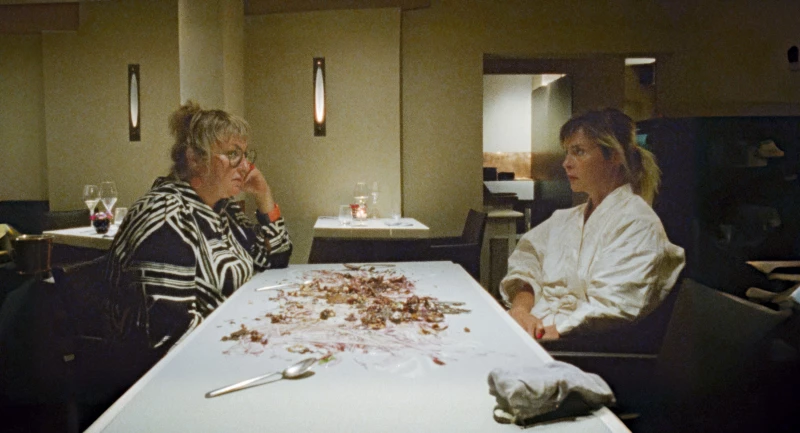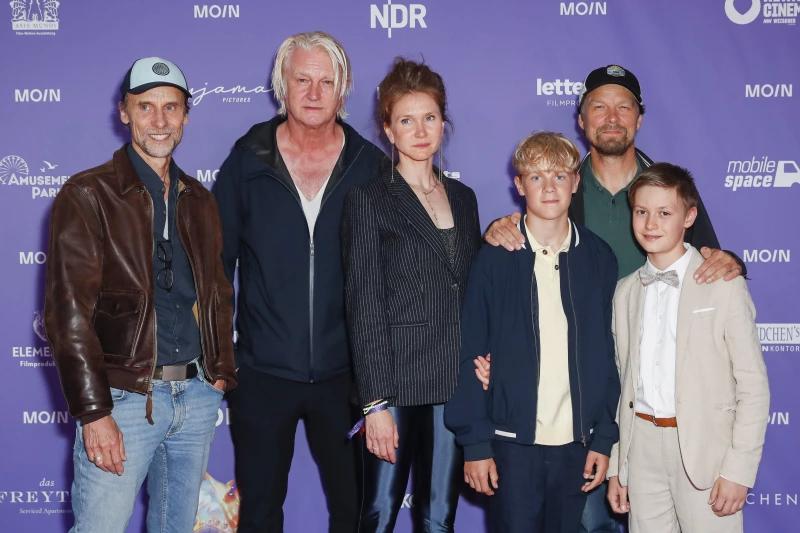Carla Simón in Cannes competition
19.05.2025 | Romería

Her drama "Alcarràs" won the Golden Bear at the 2022 Berlinale - now Directors Carla Simón is back in competition at Cannes with her new film "Romería". Find out what the film has to do with her own childhood and Hamburg in the following article.
- Describe in one sentence what Romería is about
Carla Simón: ROMERÍA is the journey of a young girl who travels to meet, for the first time. Her biological father's family in order to understand her roots and, her parents love story in Galicia.
- An important theme of your film is the heroin crisis in Spain in the 80s. Why do we know so little about it today?
Carla Simón: The reason why we don't talk so much about it it has to do with the tabu of heroin and Aids, which is similar to other themes to talk about when people went through these kind of things and it became really painful for the families. So I think that some somehow recovering the stories of the people who lived and were young during this period, is a kind of like historical memory that, we should try to speak out basically because somehow they were a very important generation who made us who we are now. We were coming from the dictatorship in Spain, really dark and conservative period and when Franco died, then suddenly there was this boom of freedom, which was a very happy time in the Transition. But this generation, were the ones who tried to change and break with all the old values and, I think that, somehow, they needed to experiment and to live different things. And they didn't know much about drugs and heroin, and they didn't know the impact that this could have on their lives. So suddenly, the heroin crisis came in to Spain with many people who would got hooked and Aids came, and nobody was expecting these consequences. And it was devastating. Spain was the European country with the highest number of Aids deaths.
So it was complicated and dealing with this pain was hard for the families. So I think that there was something it was trying to just go on and not think so much about these times that, kind of buried these memories. And I think that, now we are in a time that it's good to rethink how we lived these and also to accept what happened and not judge them. And most important, like place, give them an important role in the Spanish History in order to become who we are now.
-david-ruano_kl.jpg?fit=max&w=1200&h=2701&q=85&fm=webp)
- The film tells parts of your own story and that of your parents. Does it make your work as a director on set easier or more difficult?
Carla Simón: This is a difficult question because, I think that somehow, the fact that you are very very connected to the story you are telling in an emotional way brings a lot of, like, personality and essence to the film, and also guides you through the story in a very genuine way. And you feel the reason why you are telling this, very deep, it's somehow an emotional journey as well, which I think it shows on the screen. But it's true that sometimes you have to kind of be able to understand when reality is not helping you to tell the story and when you have to play more with fiction and ROMERÍA has a lot of fiction.
My family is not at all like the family we are portraying. Like, maybe there's some inspiration, but not so much the family configuration, which is different. The things that are told in the film didn't happen really, because I didn't meet my family when I was a teenager or I didn't do this trip when I was 18. I did it later and also I met actually two of my uncles in Madrid when I was 18, but it was different. So I think that, this idea of taking like just the heart of the story that you want to tell and trying to turn it into something else is something that requires some time. But to me after these films is about my families, I think that I managed to kind of be able to see the stories as the stories. And also because this falls in the past, my past, and I it's easier than when you are living something in the present and you try to tell a story about that. And also I think that the script phase it allows you to be very, very connected with what you are doing. But then in the shooting you really have to be able to look at it as a film.
- What is the connection between ‘Romería’ and your first two feature-length films ‘Alcarràs’ and ‘Estiu 1993’?
Carla Simón: Basically the connection between the three films is the source of inspiration, which is my family. I have a very, very big family, with different branches. And each of them is inspired by one different branch. ESTIU 1993 has more to do with my biological mum's family and also my adoptive dad’s family, which is the same one because they were siblings. And then ALCARRÀS has to do with my adoptive mum's family. And ROMERÍA with my biological dad's family. So this is the connection between them, thenI think that they have very different films with different characters. They are films that portray families, different kind of families. But at the end, this kind of relationships, they are there, you don't choose them, there are things you are born with and they are very complex. And they have, profound love, but also some trauma and the fact that, they exist forever and you then choose them, make them sometimes complicated. And I like to study this a lot, I guess because I was born in this kind of big family and I've been always, listening to their stories and also observing how the relationships are.
- Where did you shot ‘Romería’?
Carla Simón: We shot ROMERÍA in Galicia, around Vigo which is this part in the south of Galicia by the sea. For me was very special to shoot there because I had shot two films before in the rural countryside in Catalonia. So this time we went on the other side of Spain and by the sea, which was a different landscape. The landscape here was very, very important. There was like a kind of even a spiritual connection with these places for me because I know that they are the places where my parents lived their love story. So somehow to go there and film these spaces where I know that they had been it has something kind of mystical.
I was beautiful to shoot there. It's a very special place also, because Vigo is a very industrial city but at the same time it's by the sea and it has a very beautiful old town in the middle of the city. So it has many particularities.
And then we also shot around in the Ría, which means that there is a part of the sea coming into the land. So you always see the other side of the land, as if it was a river but it's not a river, it's a sea. And they are very connected by boats. So we shot a lot in boats, which was new for me as well and it became a little bit technical. But it was very nice to be there for a while.
- How was the collaboration with ‘The Post Republic’ in Hamburg and what did you do there?
Carla Simón: I was already in my 6th month of pregnancy when we started picture post so could only do an early grading session to determine the look of the film in the grading. We were still editing in Spain during the first grading sessions with the colorists. For the later grading sessions it was getting harder for me to travel. The Post Republic used their remote grading pipeline and calibrated my iPad so that I could attend the grading sessions from Spain. Our DoP Helene Louvart was present in the grading.






